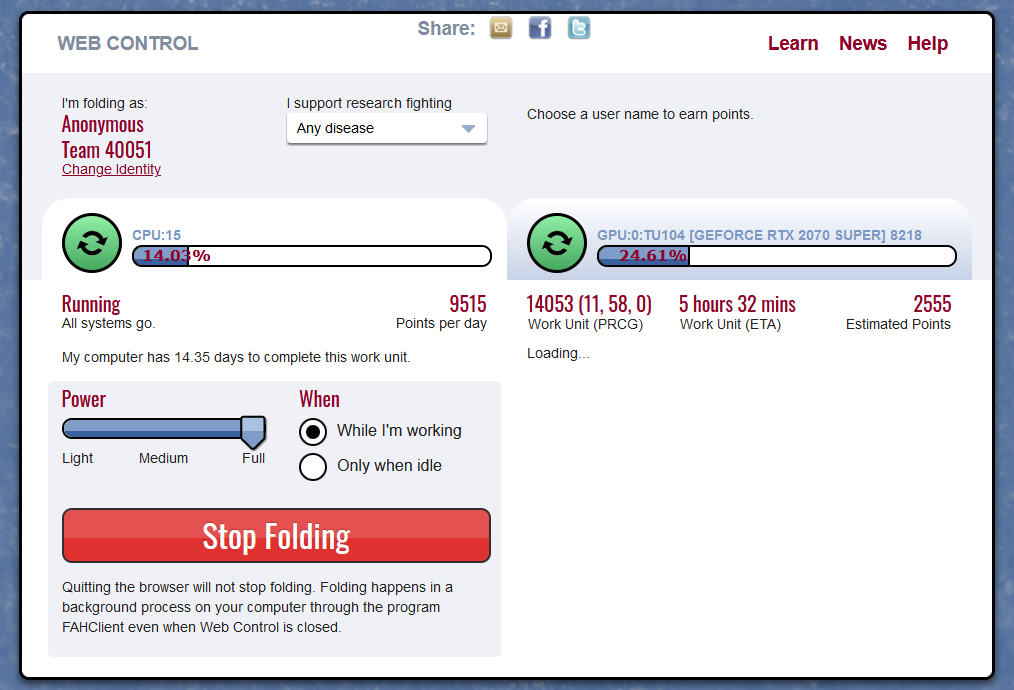Help Cure Coronavirus with Your PC's Leftover Processing Power
Protein folding is key to finding a cure.
The Coronavirus is causing lots of problems around the world, and it can feel a bit unfair that many of us are home living our lives, unable to help. However, that doesn't mean we can't do anything. Folding@Home announced that it is taking the fight to the Coronavirus, and you can donate your computer's leftover processing resources to help researchers find a cure.
Folding@Home is a distributed computing project run by the Stanford University, aimed at learning about protein folding with the purpose of fighting disease. Distributed computing means that rather than using one big supercomputer, Folding@Home relies on users donating their computer's reserve power to the organization as a charity. By concentrating the computing power of the untold masses on singular problems, the organization can wield the power of a supercomputer, but without the cost.
To understand how this helps, we have to explain a little bit about protein folding. When proteins are made they emerge as a long string, but for this string to be useful to the body, it needs to fold into a three-dimensional shape. These folded proteins can be found on the surface of cells and they determine what enters and exits the cell.
The 2019-nCoV also has proteins on its surface called spikes, which trick the ACE2 lung cell surface receptor into letting the virus into the cell and starting a viral infection. One way to stop infection is to find a way to block this protein that resides on the virus, preventing the virus from binding to our cells, and thus rendering it unable to establish an infection.
To do this, computer simulations need to be run to find out the shapes of this viral surface protein, as well as shapes of proteins to block it. This requires a lot of computing power as proteins are very complex, consisting of hundreds of molecules that are constantly folding into different shapes.
How to Install and Use Folding@Home to Fight the Coronavirus
1. Download and install Folding@Home as you would a normal program.
2. Use Custom Install options to set the startup preferences of your choice.
Get Tom's Hardware's best news and in-depth reviews, straight to your inbox.
3. Run Folding@Home. You will automatically be redirected to the web control.
4. [Optional] Enter a name and join our Team: 40051

After these short easy steps, the system will automatically run the protein folding simulations. Currently, the Stanford team running Folding@Home is putting some allocated resources towards researching the Coronavirus, unless selected otherwise.
You will be able to adjust some settings to set how much computing power you want to donate from both your CPU and graphics card.

Of course, we do have to note that while you don't have to do much to help here, allocating your PC's leftover resources will consume more power, so it will raise your power bill a little bit.
A word of warning though: if you choose 'Express Install' the program will install in a manner that will automatically start it whenever your PC is running. If you are happy to donate a bit of power and your computer's reserves to solving this problem, go ahead and select that option. If you want more control over your power usage, be sure to select the custom install option and tick the boxes appropriate to your preferences.
Niels Broekhuijsen is a Contributing Writer for Tom's Hardware US. He reviews cases, water cooling and pc builds.
-
N_tell Reply
lolpunkncat said:Ah....remember a time when we did this in hopes of finding intelligent aliens? -
mdd1963 I don't trust this claim of the folding's 'Corona-Virus' intent as far as I can throw it...Reply
(I'd suspect someone is crunching crypto-currency in one form or another!) :) -
greatmaharg Reply
Folding@home has been around for years, it's a project by Stanford University.mdd1963 said:I don't trust this claim of the folding's 'Corona-Virus' intent as far as I can throw it...
(I'd suspect someone is crunching crypto-currency in one form or another!) :) -
dethkult Replymdd1963 said:I don't trust this claim of the folding's 'Corona-Virus' intent as far as I can throw it...
(I'd suspect someone is crunching crypto-currency in one form or another!) :)
Folding's older than any kind of crypto bruh 🆒 -
Unolocogringo Reply
I've been running F@H since 2004.mdd1963 said:I don't trust this claim of the folding's 'Corona-Virus' intent as far as I can throw it...
(I'd suspect someone is crunching crypto-currency in one form or another!) :)
Please do not start false rumors. It is a major donor for scientific research. My computers fold protiens for several Universities now. -
SaltyMaverick This is awesome. I'm more than happy to help. I've got a Ryzen 9 3950X and an RX 5700 XT chugging at this problem now. ;)Reply -
SaltyMaverick Reply
Hey, I like that point tracker you have. How do I get one of those?Unolocogringo said:I've been running F@H since 2004.
Please do not start false rumors. It is a major donor for scientific research. My computers fold protiens for several Universities now. -
Rogue Leader Replymdd1963 said:I don't trust this claim of the folding's 'Corona-Virus' intent as far as I can throw it...
(I'd suspect someone is crunching crypto-currency in one form or another!) :)
Please do NOT spread completely untrue rumors like this. F@H has been around for a very long time and has done a TON of research for good. Its run by Stanford University. There is precisely 0 evidence to back your claim up, and even joking about it is in poor taste. -
velocityg4 This might get me folding again. I just hate to use so much extra electricity. There's a big difference between idle and full load. Plus with how long protein folding takes. Then how long it would take a cure to go from a lab concept, to animal testing, human trials and so forth to market. This strain will likely have long since passed.Reply
punkncat said:Ah....remember a time when we did this in hopes of finding intelligent aliens?
I did that for a couple years with Seti@Home classic. Mostly I loved the screensaver. Remember when people were obsessed over screensavers? Anyways they changed it to be a part of BOINC . My old work units didn't translate over. Worse yet the new floating 3D screensaver sucked:p. I kept classic running for a while but gave up eventually. I think when I stopped using Mac OS 9.
